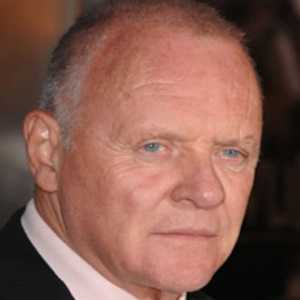Sir Philip Anthony Hopkins CBE (born 31 December 1937) is a Welsh actor, director, and producer. One of Britain's most recognisable and prolific actors, he is known for his performances on the screen and stage. Hopkins has received many awards and nominations during his career, including two Academy Awards, four BAFTA Awards, two Primetime Emmy Awards and a Olivier Award. He has also received the Cecil B. DeMille Award in 2005 and the BAFTA Fellowship for lifetime achievement in 2008. He was knighted by Queen Elizabeth II for his services to drama in 1993.
After graduating from the Royal Welsh College of Music & Drama in 1957, Hopkins trained at the Royal Academy of Dramatic Art in London. He was then spotted by Laurence Olivier who invited him to join the Royal National Theatre in 1965. Productions at the National included King Lear (his favourite Shakespeare play), Coriolanus, Macbeth, and Antony and Cleopatra. In 1985, he received great acclaim and a Laurence Olivier Award for his performance in the David Hare play Pravda. His last stage play was a West End production of M. Butterfly in 1989.
Hopkins' early films include The Lion in Winter (1968), A Bridge Too Far (1977), and The Elephant Man (1980). He received two Academy Awards for Best Actor for The Silence of the Lambs (1991) and The Father (2020), becoming the oldest Best Actor Oscar winner to date. His other Oscar-nominated films include The Remains of the Day (1993), Nixon (1995), Amistad (1997) and The Two Popes (2019). Other notable films include 84 Charing Cross Road (1987), Howards End (1992), Bram Stoker's Dracula (1992), Shadowlands (1993), Legends of the Fall (1994), The Mask of Zorro (1998), and MCU's Thor franchise (2011–2017). He reprised the role as Hannibal Lecter in Hannibal (2001) and Red Dragon (2002).
Since making his television debut with the BBC in 1967, Hopkins has continued to appear on television. In 1973, he received a British Academy Television Award for Best Actor for his performance in War and Peace. He received two Primetime Emmy Awards for Outstanding Actor in a Drama Series for The Lindbergh Kidnapping Case (1976) and The Bunker (1981). Other notable projects include the BBC film The Dresser (2015), PBS's King Lear (2018) and the HBO series Westworld (2016-2018), for which he received another Primetime Emmy nomination.
Early life and education :
Philip Anthony Hopkins was born in the Margam district of Port Talbot on 31 December 1937, the son of Annie Muriel (née Yeates) and baker Richard Arthur Hopkins. One of his grandfathers was from Wiltshire, England. He stated his father's working-class values have always underscored his life, "Whenever I get a feeling that I may be special or different, I think of my father and I remember his hands – his hardened, broken hands." His school days were unproductive; he would rather immerse himself in art, such as painting and drawing, or playing the piano than attend to his studies. In 1949, to instil discipline, his parents insisted he attend Jones' West Monmouth Boys' School in Pontypool. He remained there for five terms and was then educated at Cowbridge Grammar School in the Vale of Glamorgan. In an interview in 2002, he stated, "I was a poor learner, which left me open to ridicule and gave me an inferiority complex. I grew up absolutely convinced I was stupid."
Hopkins was inspired by fellow Welsh actor Richard Burton, whom he met at the age of 15. He later called Burton "very gracious, very nice" but elaborated, "I don't know where everyone gets the idea we were good friends. I suppose it's because we are both Welsh and grew up near the same town. For the record, I didn't really know him at all." He enrolled at the Royal Welsh College of Music & Drama in Cardiff, from which he graduated in 1957. He next met Burton in 1975 as Burton prepared to take over Hopkins's role as the psychiatrist in Peter Shaffer’s Equus, with Hopkins stating, "He was a phenomenal actor. So was Peter O'Toole – they were wonderful, larger-than-life characters." After two years of his national service between 1958 and 1960, which he served in the British Army, Hopkins moved to London to study at the Royal Academy of Dramatic Art.
